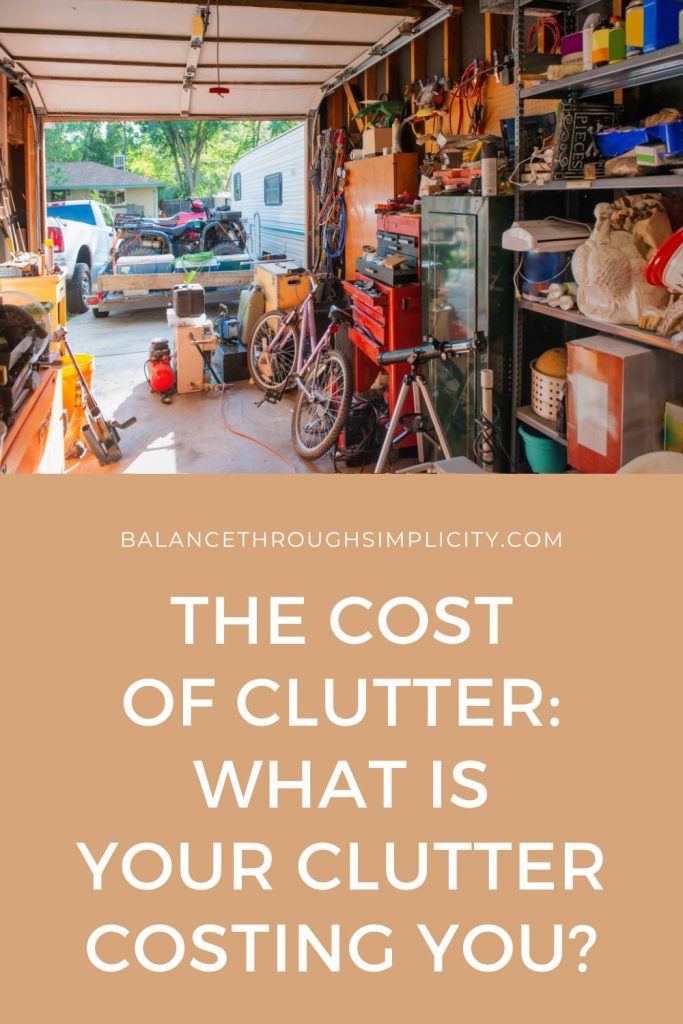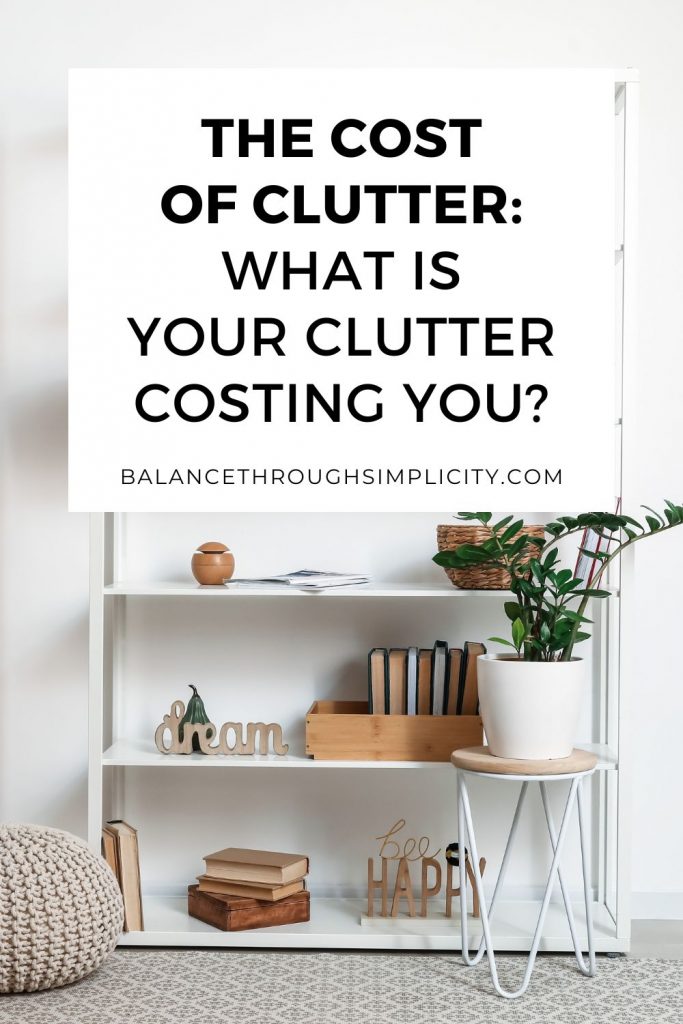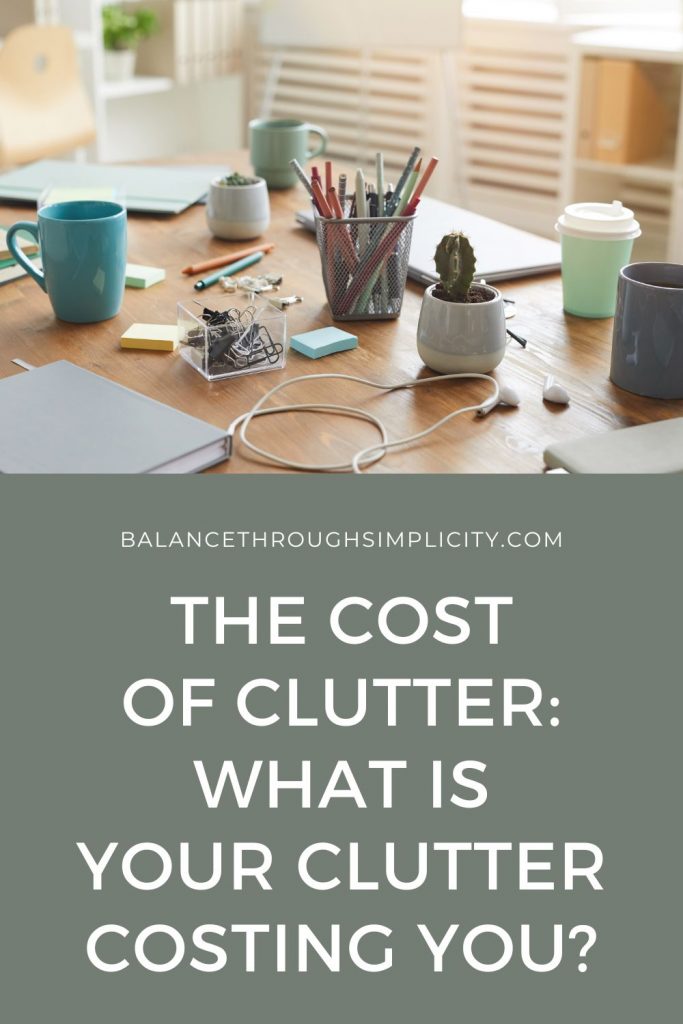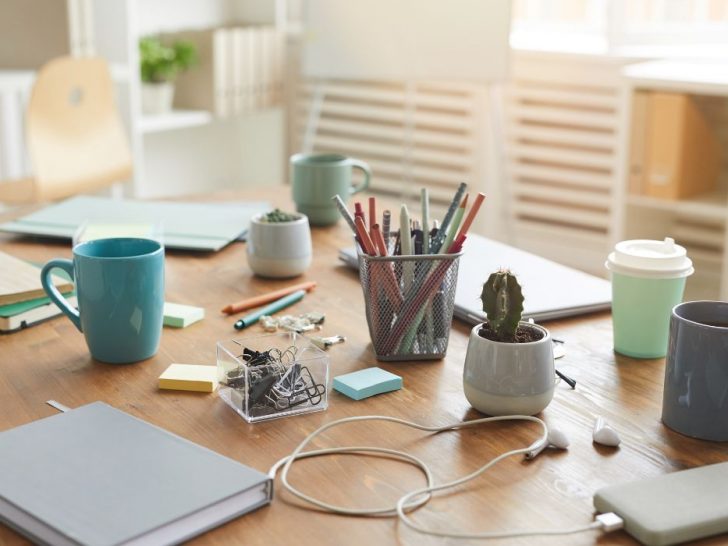THE COST OF CLUTTER: 14 WAYS YOUR CLUTTER IS COSTING YOU
Clutter can take up space in our home, heart and mind but what else is your clutter costing you? In this article we look at the cost of clutter and 14 ways your clutter might be costing you.
WHAT IS CLUTTER?
Clutter is the excess stuff that we don’t use, need, find purposeful, meaningful or contributes and adds value to our life in some way. To use Marie Kondo’s words, clutter is also stuff that doesn’t ‘spark joy’.
What I define as clutter might be different to how you define clutter so as you read this article, bear in mind that I’m not telling you exactly what’s cluttering your home and life in specific detail. Instead, hopefully, I’ll encourage you to think about the stuff in your home, schedule, mind and life so you can decide what’s clutter and what’s not for yourself.
Before we look at what clutter might be costing us, here are a few points that I think it’s worth raising first to help you consider what clutter might be costing you.
1. Clutter is personal
To give you a very simple example, our garage has many of my husband’s DIY tools. To me, they’re clutter because I don’t know what some of them even are, let alone how to use them! They’re taking up space, getting in my way when I do need to find something I need in the garage cupboards and so, to me anyway, they’re clutter. To my husband, a hoarder, they’re for a purpose and he uses them regularly.
How we define ‘clutter’ is highly personal. This is a key point to remember if you’re trying to get your spouse to declutter. Make sure you both understand the term ‘clutter’ in the same way!
2. Clutter changes over time
What clutters our space changes over time. You may no longer use art and craft materials if you no longer have time or inclination to be crafty in your spare time. These materials can take up valuable space and if you don’t need, use or want them anymore, they could be just clutter.
If you downsized and have a smaller garden but still took all your gardening tools with you but no longer use them, do you really need to keep them? Could they be donated or sold to someone who could benefit from them?
We hold onto clutter for many, many reasons so as you read this article, think about how your life and circumstance might have changed and whether you’re holding onto clutter that you don’t really need any more.
3. Clutter comes in different types
There are so many different types of clutter that fill our lives in various ways. From paperwork to ‘just in case’ clutter, from mess in our teenager’s room to the hidden clutter lurking behind closed cupboard doors, from a cluttered mind to a cluttered schedule. The different types of clutter cost us in different ways.
WHAT IS YOUR CLUTTER COSTING YOU?
Let’s have a look at how clutter might be costing you.
1. Space
Most obviously, clutter takes up space in our homes. Getting rid of clutter will free up space in your cupboards, kitchen, bathroom cabinets, your child’s room, on your bookshelf and anywhere else that clutter collects. Declutter your home and reclaim some physical space so your home looks and feels clearer, more spacious and with more ease of access and flow from room to room.
What could you use more space for? Hobbies, inviting guests over to stay, playing games with your kids, exercise, setting up a home office, a playroom for your kids, or as a spare bedroom? Maybe even parking your car in the garage instead of it being used as storage space?
2. Time
Your stuff requires looking after, cleaning, clearing, tidying up and moving around. Every item in your home sends out messages about what it needs and how it requires looking after and maintaining. This care requires your time and your time is precious.
Although there’s absolutely nothing wrong with being house proud and curating a clear, clean and tidy space, do you really want to be spending your free time managing your home and the inventory in it? Or would you rather be spending your time doing other things. In the words of Mary Oliver, “Tell me, what is it you plan to do with your one wild and precious life?” I think most of us would rather not be spending too much of it cleaning and clearing!
A decluttered home is also easier to organise so we can find things more easily. According to The National Association of Professional Organizers (NAPO), on average we spend one year of our lives looking for lost items. That’s over 8,700 hours looking for lost or misplaced things!
Declutter your home, get rid of the excess stuff, find ways to be more organised and develop some good habits for yourself and your clutter-free home to give yourself more time for living life.
3. Calm
A clutter-free home often feels calmer and more peaceful. It’s a sanctuary from the busy world, a quiet haven for introverts to retreat to when they need to rejuvenate, a source of comfort for those with chronic illness and health challenges, stability and security for those with an anxious mind and a place to enjoy being with family and friends.
A cluttered and chaotic home can raise stress levels so declutter your home for more calm in body and mind.

4. Energy
Dealing with our clutter costs us energy. Physical energy in moving, cleaning and dealing with our stuff. According to the National Soap and Detergent Association, getting rid of clutter would eliminate 40 percent of housework in the average home.
So, perhaps you could make it quicker to clean your home and physically easier too with less stuff to move, reach and stretch to – on the floor, high up in cupboards, under beds, on the stairs and in garages, sheds and the loft! Declutter your home to give you more energy for other things!
5. Money
Clutter costs us money. Money to purchase it, money to store it, sometimes money to get rid of it. Before you hit the shops, ask yourself whether you really need that item.
- Do you have something similar you could use instead?
- Could you borrow it?
- Where will you keep it when not in use?
- Is it an impulse buy that if you waited to buy, you might decide against it after all?
- Look around your home now. Would you buy what you have in it again? Do you use everything in it?
These are just some of the questions you can ask to find out what your clutter is costing you financially. Reconsider the clutter in home, stop the cycle of clutter from the beginning by not going shopping so often, think before you go shopping and go armed with a list.
Experiment with only buying the essentials and the meaningful and give yourself and your credit cards a break. What do you learn about how clutter costs you money?
6. Stress
According to a 2016 study by Cornell University, stress triggered by clutter may also trigger coping and avoidance strategies, like eating junk food, oversleeping or binge-watching Netflix. So, to help us cultivate healthy habits for body and mind, start with clearing your clutter.
7. Mental health
Building on the point above, research has shown a correlation between a cluttered home environment and increased stress.
If you struggle with mental health issues, decluttering your home might be a helpful step towards looking after yourself. Not only will you have more time and energy to put towards doing things to improve your mental wellbeing but you’ll have a calmer, clearer and more soothing home to spend time in.
Meditation, mindfulness, journaling, exercise and taking good quality rest are just a few of the activities we can do to boost our mood and all of these are easier if you have time and space at home to do them in.
8. Productivity
A cluttered home and work environment reduces our ability to focus. We get distracted from too much visual clutter, too many stimuli and things to look at. We have to move stuff out of the way to find and get to what we’re looking for so we waste time and lose our focus and train of thought.
With too much stuff on our desk, too many tabs open on our computer, piles of paperwork, emails in our inbox, post-it notes stuck to our wall plus anything else a cluttered home and workspace might have, it’s no wonder our brains can’t cope with the multi-tasking. We flit from one thing to another, doing A whilst thinking about B, forgetting about C and trying to find D. Focus and clarity go out the window along with our productivity.
Declutter your home to be more productive and organised. If this topic interests you, you might like to read more about minimalism and time management.

9. Freedom
With our clutter taking up time, space and energy, it’s no wonder that we feel burdened by our stuff. Instead of going out for the day on a whim we might feel compelled to catch up on cleaning.
Every home requires maintenance but a home with less stuff in it is certainly quicker and easier to clean and tidy. Give yourself more freedom by decluttering your home. What would you do with that freedom?!
10. Social connections
Sadly, it’s not uncommon for those of us with too much clutter to feel embarrassed about the state of our homes and we don’t want anyone else to see them.
We worry about what our home says about us and what people will think if they come to visit us. This means we say no to visitors, lose those important social connections that are so important for our mental health and put people off from coming over for coffee to chat, or our children being able to invite their friends over to play.
Your clutter is just stuff. You may feel it holds power over you and be difficult for you to part with it, but at the end of the day, your stuff is just physical stuff. Don’t let that stuff get in the way of building important human connections in your life right now.
And, if you find it difficult to get rid of stuff, please know that true friends and loved ones will be coming to see you and not your home. They might even be willing to help you declutter too!
11. Relationships
Clutter can put stress on relationships. I hear from many readers who not only struggle with clutter they’ve accumulated, but clutter their partner or spouse has built up too. It’s incredibly frustrating and difficult to live with a hoarder if you’re not one or vice versa.
How we feel about living in a cluttered environment, our home, is one thing and we can decide to do something about it if it’s cluttered and we don’t like it that way, but what do you do if others in your home don’t feel the same way?
Clutter can be a very emotive topic and people feel strongly about holding on to and getting rid of it. It’s not just about the clutter but the feelings we attach to it, what it represents and what we might be parting with, letting go of or getting rid of as we declutter.
Clutter can cost us peace and harmony in our relationships and cause tension, frustration and resentment instead.
12. Appreciation of the small and meaningful
A shelf full of knick-knacks and ornaments and boxes of old photos both make it difficult for us to see and find what we’re looking for. You may feel that a home full of clutter is a home full of memories and important things. This may well be true but it’s also true that when you have more stuff it’s easy to lose sight of the small things, the meaningful and the important because they simply just get lost amongst everything else.
I’d rather have a shelf with one or two of my favourite mementos passed down from my parents or from travels abroad. I can see them clearly, they’re on display for myself and all to see, not lost in the crowd or hidden behind things and they’re easier to move, dust and clean!
I’d also rather have a few less boxes of old photos, clear out the random and fuzzy ones and keep the special and favourite photos that hold a place in my heart. I want to find them quickly and easily and enjoy looking at them, rather than getting frustrated I can’t find them and leaving them hidden in a box somewhere, out of sight and out of mind.
Declutter your home to give space and importance to the small and meaningful that might get hidden or otherwise forgotten.
13. Being present
Practicing mindfulness and living in the present moment is an increasingly popular tool to help us combat overwhelm and promote better health and wellbeing. Instead of dwelling in the past and feeling anxious for the future, mindful living is about focusing on the here and now.
Ground yourself in the present moment, be grateful for what you have and where you are right here, right now. Being truly present is a skill that we get better at as we practice. Switch off from the stresses and strains, focus on what you’re doing in the moment, avoid multi-tasking and distractions and focus on your breathing and the activity you’re doing now – perhaps reading this!
There’s a wonderful relationship between mindfulness and decluttering but more than that, the art of being present in the moment is easier when you have a decluttered home with less on your mind, less visual distraction, less to remind you that the present is overstuffed and overwhelming and more calm and peaceful instead. Too much clutter makes being in the present more difficult and uncomfortable.
14. Peace of mind
Clutter costs us peace of mind in different ways. When I notice my home becoming cluttered, it doesn’t feel right until I’ve got it back to clear and tidy. I can’t relax and focus on what I want to do in my mind until the environment around me is more clear.
For the older generation, it might be you’re worried about how to look after your home with limited physical mobility, or who will deal with your stuff if and when you’re not able to.
It might be that you’re struggling financially and the clutter in your home could be sold to help pay bills, clear debt or it’s a sign of problems with too much spending and shopping which maybe need addressing.
Clutter costs us peace of mind and in a world that feels overwhelming, fast paced, even scary at times, peace of mind is an invaluable mindset to cultivate and protect.

SHARE YOUR THOUGHTS
I hope you enjoyed this article and it gave you food for thought. How does your clutter cost you? Is there something that I haven’t mentioned that you’d like to share? I’ve love to hear your thoughts on the cost of clutter to our lives so please leave a comment below!
HELPFUL RESOURCES FOR DECLUTTERING YOUR HOME
If you’d like to explore decluttering your home, here are some articles which you might find useful:
- Decluttering Mindset: How to Get Into the Right Mindset to Declutter
- How to Find the Motivation to Declutter Your Home
- How To Declutter Without Feeling Wasteful: Is Decluttering a Waste of Money?
- Decluttering in Midlife: How to Declutter in Midlife With Ease
- Why Declutter Instead of Organise
GET YOUR FREE DECLUTTER ACTION PLAN
Pop your details in the box below to get your free Declutter Action Plan. This is a worksheet to help you come up with an action plan for getting rid of your clutter and regain control of your home and time (plus so much more!).


Laura
Sunday 14th of May 2023
Hi Antonia, a well thought out article, as always! To expand a little on your point about clutter changing over time, I suggest that some clutter is also cyclical in nature. The can of tomatoes in my pantry is useful until it goes past its expiration date, at which point it promptly turns into clutter. Certain categories of items in our lives are cyclical, and if we don't have them set up for ease of use and regular turnover, we create future clutter for ourselves. (I note that I'm particularly bad for buying "just in case" pantry items that never are needed!)
Balance Through Simplicity
Wednesday 17th of May 2023
Hi Laura, this is a very good point. Thank you for mentioning it! Decluttering has many benefits but it's also helpful to develop some organisation and habits (that suit you and your lifestyle) to help maintain and make the most of your home too.